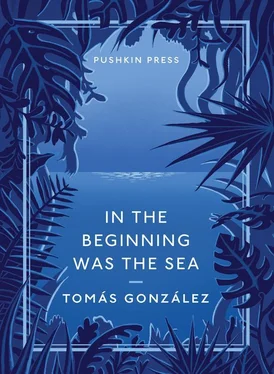The last passenger to arrive was a cantankerous old man with Parkinson’s disease clutching a lit cigar between trembling fingers. When he was finally hoisted aboard, the ferry’s engines began to roar and the engine room belched thick clouds of blue smoke. “Let’s just hope this heap of shit doesn’t sink before we get there,” thought Elena.
Elena had no desire to spend the night in Turbo. A porter with a handcart wheeled her suitcase to the station where she sat on a metal chair to wait for a bus. When she discovered that the next bus would not leave until 9.30 p.m., she went to a restaurant and ordered roast beef, cassava and a mountain of rice atop which a fried egg glittered like a star.
At ten o’clock the next morning, the bus rolled in to Medellín. Elena felt her heart race as they arrived. Emerging from the dazed stupor of the long journey, the passengers suddenly became cheerful and talkative. The sky was blue and cloudless, a hot, dry wind came through the open window. Pleasurably breathless, her eyes half closed, Elena let her hair billow in the breeze while one or two of her fellow passengers stared.
When her mother opened the door, Elena was overcome by a heavy smell of scented candles.
“Still burning that rubbish?” said Elena. “One of these days you’ll poison yourself.”
Her mother carped and whined like a child.
The house was filled with smoke. Everywhere there were statues of saints lit by votive candles. Elena took the suitcase up to her room.
“You want something to eat, Elenita?” her mother called.
Elena said she would eat later, that right now she desperately needed to take a bath.
“What about William?” she called down from the bathroom. “Does he still call round?”
“Almost every day, hija ,” said her mother. “He and Luz Marina and the children come round most afternoons. He’s a good son, my William, may God protect him.”
A powerful jet gushed from the tap, splashing the bathroom floor.
That night, after dinner, Elena went out to the park. Having had a long siesta after lunch, she felt wide awake. Friday night in Envigado, and the open air bars— heladerías —were heaving.
In the Puerta del Sol, Elena found Jaime Díaz and Roberto D’Alleman, drinking companions on J.’s regular binges before they moved to live on the finca . The three friends drank into the early hours and Elena did not complain about being driven mad by the monotonous rains but instead — borrowing some of J.’s pet phrases — extolled the virtues of a peaceful life by the sea compared to a toxic life “in the shadow of the chimneystacks of the Coltejer factory”.
To her mother’s horrified disgust, she staggered home drunkenly at seven in the morning, with dark circles around her eyes.
“TELL J. this is the last extension I can authorize on the loan,” the bank manager informed her.
His name was Fernando and he and J. had been school-friends. Despite his youth, he was almost completely bald and grimly serious. “He might be a first-rate banker,” J. often said, “but he’s a piss-poor excuse for a human being.”
Fernando had a low opinion of Elena. He had heard rumours that she and J. were living in sin, and meeting her only confirmed his preconceptions. He treated her with a mixture of desire and disdain that manifested itself in polite superciliousness, a ready smile and flushed cheeks. Elena felt a visceral loathing for the guy.
Having succeeded in renewing the loan, Elena stayed on in Envigado for a fortnight enjoying the same wild, chaotic life she and J. had shared in the months before they ran away to sea.
The return journey took thirty hours. The road outside Medellín was blocked by an unexpected landslide causing an endless tailback of cars along the mountain path. For several hours while bulldozers shifted the rubble, the passengers whiled away the time sleeping, chatting half-heartedly, eating boiled eggs and getting out to urinate by the roadside.
Elena slept through the night, a long dreamless sleep from which she was woken in the early hours by the roar of the bus starting up again. She woke in a foul mood. “Just my fucking luck to get caught in a landslide, my life is shit,” were her first words to the astonished woman sitting next to her.
As the bus drove through the oil palm plantations, a torrential rainstorm battered the earth. The windscreen wipers flicked frantically, trying in vain to sweep away the cataract coursing down the glass. Headlights on, the bus moved cautiously while the passengers, disoriented by the rain hammering on the bodywork, felt shut in by the condensation gathering on the windows.
The storm eased just before they came to Turbo. By the time the bus pulled into the town square, it had slowed to a steady drizzle that seemed as though it might go on forever. The central plaza was a mire. People carefully picked their way across the streets, hiking up their trousers to avoid the mud.
Elena cursed the vast swamp.
When Julito’s boat finally pulled into the cove, Elena was surprised not to see J. waiting, waving to her from the beach. She felt disappointed. Though it was not raining, the sky was overcast, the sea dark. She found J. lying in bed, reading. His feet were pitted with fungal infection.
“It’s the rubber boots,” he explained, jerking his chin at his feet. “It’s agony, even when I’m sitting down.”
They kissed and she sat on the edge of the bed, staring at his feet.
“You’re in a terrible state,” she said.
The fungal infection presented as white pustules with tiny tentacles that buried into the skin causing terrible itching. When they burrowed beneath the toenails, the pain was unbearable. The pustules had to be carefully removed and the livid, pockmarked skin smeared with a thick layer of fungicidal cream. The treatment was lengthy, painstaking and painful. The pustules removed at night would reappear by morning.
Elena immediately took over caring for him with great success. Being a coward when it came to pain, J. needed someone to force him, almost bully him, into persisting with the treatment. A week after Elena came home J. was still unable to walk, and only after a fortnight did he take his first painful steps along the hallways.
GRADUALLY, the waters began to recede. As time passed, the clouds were slower to mass into rain-storms and the sunny interludes grew longer.
Elena had brought spare parts for the sewing machine from Medellín. Once it had been repaired, the Singer was set up on the counter in the shop so that Elena could sew while she worked. She had also brought back large bolts of cloth patterned with large red flowers. As soon as she got home, she began taking measurements, and by the time winter was over every window in the house was curtained.
J. liked the new drapes. Every time he came back from the fields he was struck by the curious sight of this crumbling wooden mansion festooned with chintz flowers. And in the afternoons, when squalls blew in off the sea, J. liked to sit out on the veranda and listen to the whipcrack of the wind lashing the strange flowers in the windows.
The rains had almost stopped by the time the coconut saplings began to bud. “Come, I want to show you something,” Gilberto said one morning after breakfast. Together they walked out to the seedbeds. Glistening buds that looked almost foetal had appeared on some of the saplings, while the fan-shaped leaves of others had already begun to unfurl.
J. had a crystal-clear picture of what the finca would look like a few years hence. These tiny, emerald-green fans would have grown to become a vast coconut plantation running the length of the beach as far as the house, and over the land on which the house now stood. Their new home — which would have no corrugated iron roofs, no stilts — would be built on the brow of the hill behind the current house. J. had never liked the noise and the stifling heat of corrugated iron roofs, and had always been disgusted by the unsightly crawlspace under the veranda which inevitably ended up full of useless rolls of wire, broken bricks and off-cuts of timber. The new house would look out onto the sea from a lofty vantage point far above the muddy paddocks which morning and night filled the current house with flies and the stench of manure. Elena and J. often went up to the site where they planned to build the new house and talked about the layout of the rooms, the bathrooms and the windows.
Читать дальше










